Recent Fire Damage Posts
Chimney Fires
2/2/2022 (Permalink)
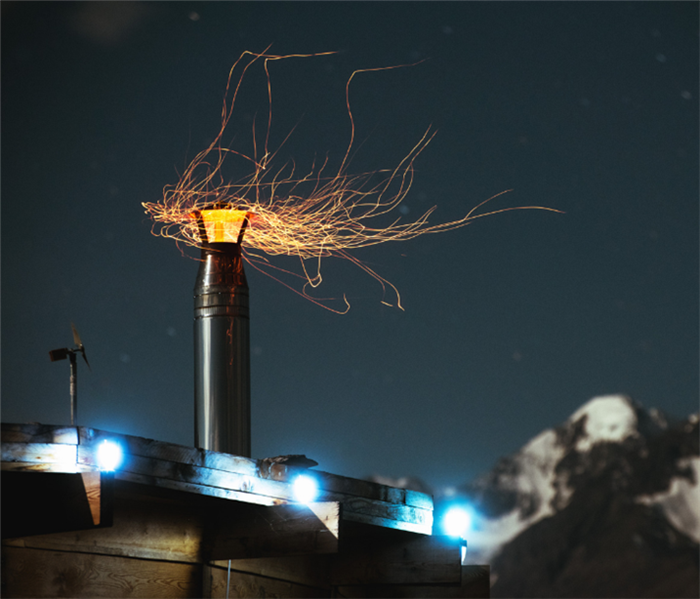 Confined fires, those fires confined to chimneys, flues, or flue burners, accounted for 87 percent of residential building heating fires. (USFA)
Confined fires, those fires confined to chimneys, flues, or flue burners, accounted for 87 percent of residential building heating fires. (USFA)
During the bitterly cold weather of the winter season, many Southern Ohio homeowners use alternative forms of heat to keep warm. Probably the most popular would be wood-burning stoves & chimneys. Though this is a great way to heat your home, there are also precautions that need to be addressed in order for this to be a safe practice.
With the help of the Chimney Safety Institute of America (CSIA), we hope to keep homeowners informed so that chimney fires are a thing of the past. In order to better prevent chimney fires, we must first understand what are the main causes. One of the most common causes is the build-up of soot and creosote. These two are the byproducts of burning wood. Every time you burn, these byproducts condensate on the walls of your flue pipe, slowly building up. Creosote specifically, is corrosive to your flue pipe as well as highly flammable.
Another large cause of chimney fires is damaged/missing caps on your chimney. During the cold weather, an uncapped chimney pipe is an open invitation for animals to enter and build nests. Materials that these animals bring in are easily flammable could start chimney fires.
Now that we understand what are some of the main causes of these fires, here are some ways to prevent your home from becoming at risk. The CSIA recommends the following:
- Schedule annual inspections & periodical cleanings of your chimney/stove and flue pipe.
- Burn dry wood only, DO NOT try to burn wet material!
- Inspect your liner. A good liner can help reduce the build-up of creosote.
- Install a quality chimney cap.
- Make sure your chimney receives adequate air and is free of blockages.
Hopefully, with these tips, your home will never have to experience the damage of a chimney fire. However, if you are facing a fire loss as a result of a chimney fire, know that there’s a pro for that! SERVPRO of Jackson & Ross, Athens & Gallia Counties is available 24/7 at (740) 286-2550 and is dedicated to making it "Like it never even happened."
Source:
“The Facts about Chimney Fires - US.” Chimney Safety Institute of America, 29 Jan. 2022, https://www.csia.org/homeowner-resources/the-facts-about-chimney-fires-your-questions-answered/.
Christmas Fire Safety
12/10/2021 (Permalink)
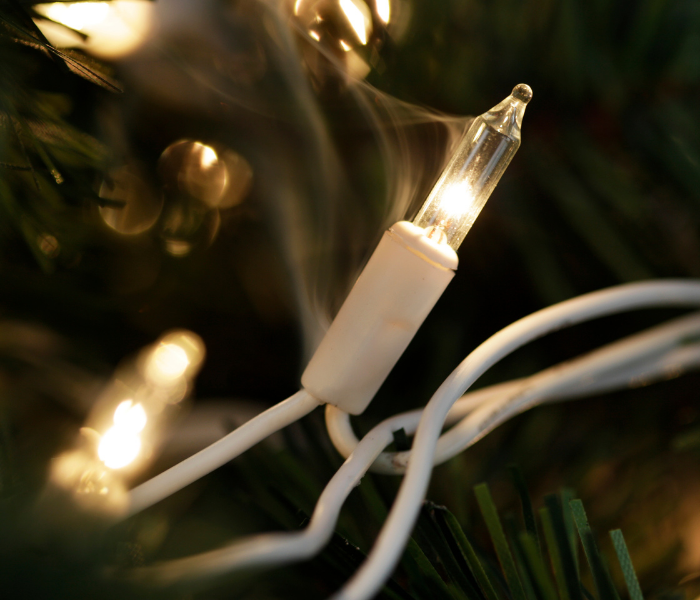 The top three days of the year for home candle fires are Christmas, New Year’s Day, and New Year's Eve.
The top three days of the year for home candle fires are Christmas, New Year’s Day, and New Year's Eve.
With the Christmas season finally here, people are starting to get into the holiday spirit and putting up decorations. With the help of the U.S. Fire Administration, let’s be mindful of potential fire hazards. Here are some tips to put a freeze on holiday house fires:
- Only use decorations that are flame-retardant or not flammable.
- Check holiday lights each year for frayed wires or excessive wear. If any damage is found, please dispose of it and replace it with a new set.
- Don’t link more than three strands of holiday lights.
- Never leave a burning candle unattended. Consider using battery-operated flameless candles.
- Keep your live Christmas tree away from heat sources and room exits. Live Christmas trees will dry over time, mixed with being close to a heat source can create a fire hazard.
- Water your live Christmas tree daily to keep it from becoming dry.
- Once the holiday has passed, dispose of your live tree when possible.
Hopefully, with these tips, we can help make your home a little bit safer this holiday season. If you are in the Southern Ohio area and facing the aftermath of a house fire, there’s a pro for that. SERVPRO of Jackson & Ross, Athens & Gallia Counties is available 24/7 to help get your home feeling like home again.
Cooking Fires
11/29/2021 (Permalink)
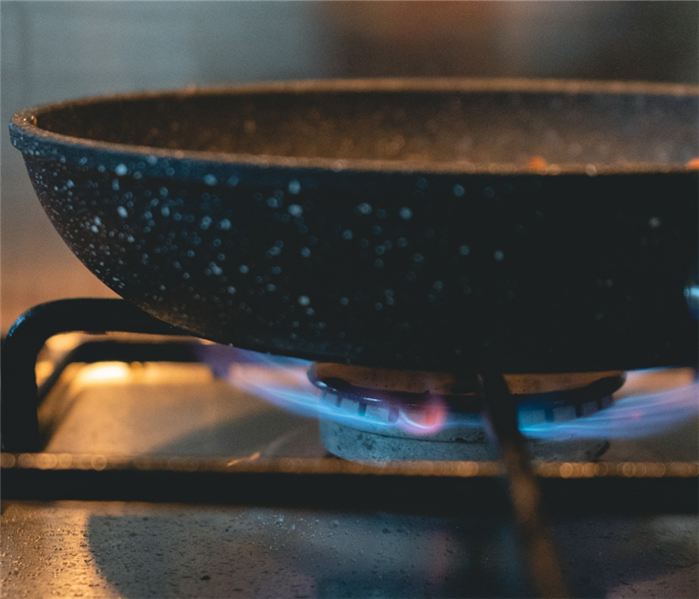 Something as simple as cooking a meal can lead to a disaster.
Something as simple as cooking a meal can lead to a disaster.
Cooking fires are the leading cause of loss in residential fires. Fire departments respond to an average of nearly 190,000 cooking fires a year. Of those fires, an estimated 170 deaths, 3,000 injuries, and $443 million in property damage were a result. This goes to show that even something as simple as cooking a meal can lead to a disaster. Here are a few tips brought to you by the United States Fire Administration (USFA) to help make sure that this trend does not continue:
- Stay in the kitchen: leaving the room while cooking at high temperatures could easily start a fire.
- Set a timer: setting a timer allows us to not get distracted while cooking.
- Keep flammable materials away from the stove: when cooking substances like grease can splatter and catch close-by items on fire.
- Turn pot handles toward the stove: turning the handles of your pots and pans towards the stove will help prevent someone from accidentally bumping and spilling food/liquids.
- Keep a lid on hand: if a grease fire does begin, quickly place a lid over the top of the pan to cover the fire from spreading.
If your home has experienced any fire, smoke, or soot damage as a result of smoke damage, don’t hesitate to call the pros! SERVPRO of Jackson & Ross, Athens & Gallia Counties are here and ready to help 24/7. Call us today at (740) 286-2550!
Furnace Maintenance
10/14/2021 (Permalink)
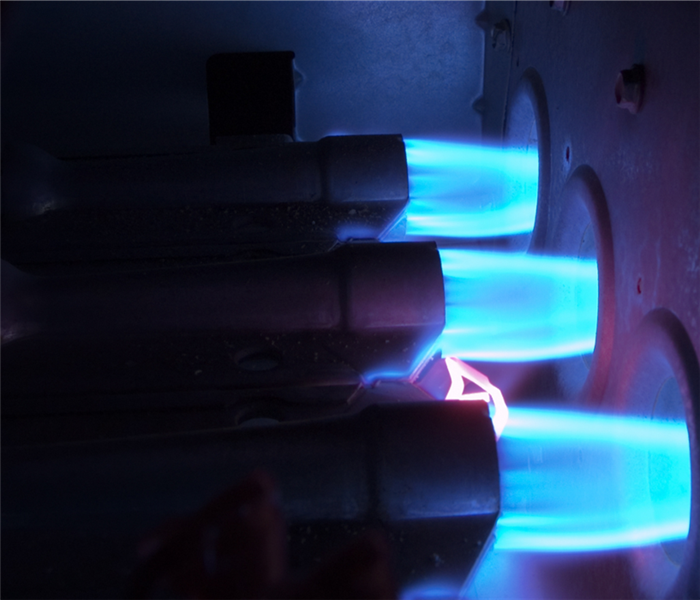 Routine care can save your furnace from unnecessary strain and potential breakdowns
Routine care can save your furnace from unnecessary strain and potential breakdowns
With the fall weather quickly approaching, the best time to clean and maintain your furnace is now instead of waiting until you need heat. Routine care can save your furnace from unnecessary strain and potential breakdowns. Here are 5 inspection tips to keep your furnace running smoothly:
- Shut off your system: we know this seems obvious, but it is crucial that you shut off the power and fuel supply from the furnace before any work is done. Record the location of the shut-off valve and the circuit breaker in case of an emergency.
- Vacuum and clean: clean the burner and blower cavities of your furnace (also the blower itself) along with the combustion chamber and remove as much debris as possible. This debris can affect performance and material left in the combustion chamber can cause corrosion.
- Inspect flue pipe: check for any dents and/or punctures and repair with foil tape. Any corroded areas should be replaced.
- Change your air filter: Changing your air filter routinely is important to ensure a well-operating furnace and clean air in your house. During the winter season, make sure you are replacing it often. If you are planning on having your ductwork cleaned by your friends at SERVPRO of Jackson & Ross, Athens & Gallia Counties, be sure to have it done prior to replacing your filters. Duct cleaning blows out all excess dust and debris from your vents and a good amount will cling to the air filter in the process.
- Clean your vents: If you do not plan to have SERVPRO professionally clean and sanitize your ductwork, it is still necessary to have clean vents. Take a vacuum hose and remove as much dust, pet hair, etc. from your vents.
Hopefully, these tips allow for this fall’s furnace inspection to go by smoothly and make for a warm clean home this winter. If you have any questions or require our professionals to make duct cleaning a breeze, feel free to call SERVPRO of Jackson & Ross, Athens & Gallia Counties anytime at (740) 286-2550!
Smoke Alarms
7/14/2021 (Permalink)
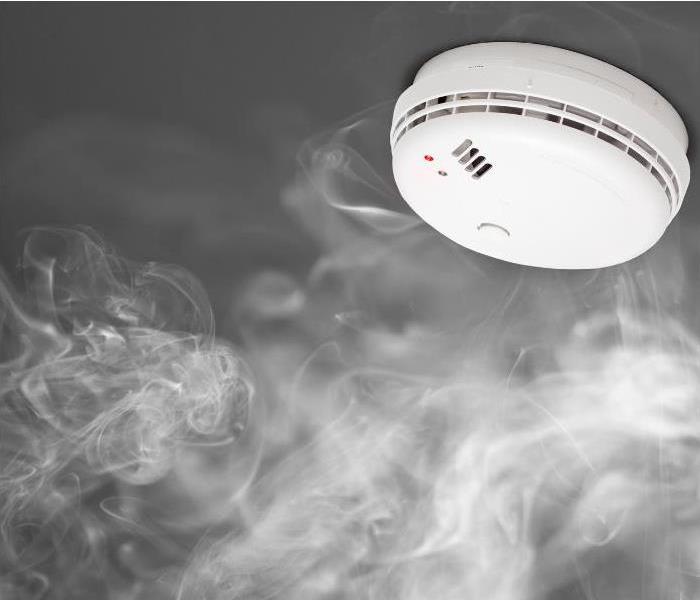 Three out of five home fire deaths result from fires in properties without working smoke alarms.
Three out of five home fire deaths result from fires in properties without working smoke alarms.
A simple smoke detector could make the difference between life and death with a residential fire. Having an operational smoke alarm system in your home is crucial when it comes to protecting yourself, your family, and your home. It is required by law to have an operating smoke alarm on each floor of your home (including basements) along with another alarm in each bedroom. Smoke alarms require very little to no maintenance depending on the type of alarm you purchase. If you decide to purchase a standard battery-operated model, the alarm itself will last 10 years and will require you to change the battery every 6 months. Choosing a hardwired or lithium-ion battery option, however, requires no battery replacement and will just need to be replaced every 10 years. This simple upkeep is proven to save lives, here are some statistics from the National Fire Protection Association (NFPA) to back it up (some may surprise you):
- Three out of five home fire deaths result from fires in properties without working smoke alarms
- More than one-third (38 percent) of home fire deaths result from fires in which no smoke alarms are present.
- The risk of dying in a home fire is cut in half in homes with working smoke alarms.
Make sure to do your part by checking in on your alarm system. If you are facing fire damage, don’t hesitate to call the professionals at SERVPRO of Jackson & Ross, Athens & Gallia Counties at (740) 286-2550.
Dryer Vent Inspection
7/12/2021 (Permalink)
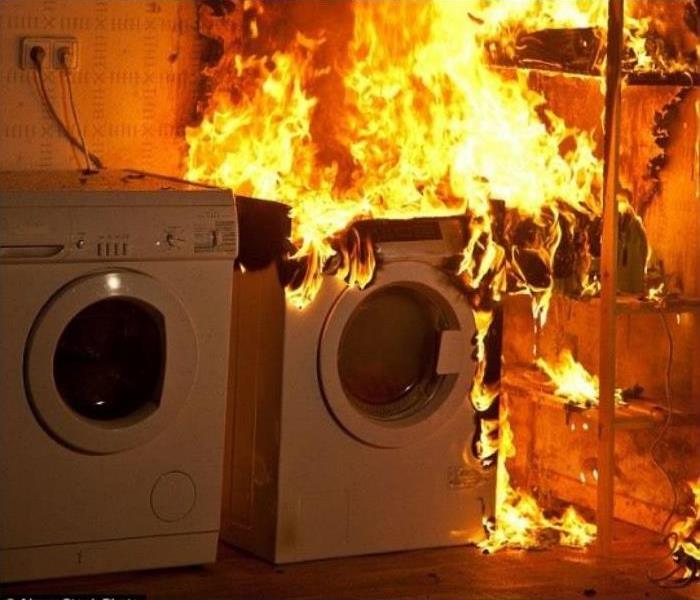 Routine inspections on your dryer can keep it running efficiently and prevent possible safety hazards.
Routine inspections on your dryer can keep it running efficiently and prevent possible safety hazards.
Even though cleaning your dryer’s filter after each cycle is great practice, there is still extra precautions to take to keep your equipment running efficiently and your home safe from a possible disaster. Even though your lint trap does catch the majority of the loose material from your laundry, there are still some that pass through. The lint that does manage to get past collects within your dryer vents. This can eventually cause your dryer to not vent air properly, leading it to not dry as well. More important than a poor-performing dryer, this material poses a potential fire hazard if exposed to too much heat.
Here are some tips to keep a clean and efficient drying system:
- Brush and vacuum out excess lint from the dryer vent
- Check your dryer hose for any dents or punctures
- Metal ducting offers better fire prevention
- Make sure the vent hood is properly sealed and allows the dryer to breathe without leaving it open to the outside elements
- Installing a dryer safety alarm can warn you of hazardous build-up
We hope that no one has to deal with the disaster of an electrical fire, but if it does happen, rest assured that SERVPRO of Jackson & Ross, Athens & Gallia Counties is here to help. If you have any questions call (740) 286-2550 today.
Firework Storage Safety
6/30/2021 (Permalink)
 Fireworks started an estimated 19,500 fires in 2018, including 1,900 structure fires.
Fireworks started an estimated 19,500 fires in 2018, including 1,900 structure fires.
It is getting close to the Fourth of July and many Americans are preparing for fireworks to celebrate. Fireworks are fun and exciting, but they can also be very dangerous if not properly handled and stored.
Below are a few tips to make sure your festivities are enjoyable but also responsible:
Keep water close
Having a water source or bucket close by is a vital safety precaution when letting off fireworks. The water can be used to soak the fireworks after firing to prevent reigniting along with putting out accidental fires.
Proper containers
When storing leftover explosives (before and after the event) make sure that they are being contained in a non-flammable, plastic container; no cardboard.
Storage environment
When putting away fireworks for long periods of time, it is advised to store them in dry cool areas. Storing them in places such as attic spaces, garages, and sheds is not recommended due to their ability to reach high temperatures that could cause an accidental ignition.
Away from children
Last but not least, make sure when putting away explosives, make sure they are out of reach from children. Having fireworks stored in a safe, locked location is key to keep them out of curious hands.
We hope these tips help keep your Fourth of July safe from any issue so that you can properly enjoy the celebration of our nation’s independence. Even though we take precautions, we understand that disaster can happen regardless. SERVPRO of Jackson & Ross, Athens & Gallia Counties are available 24/7 and always here to help!
Understanding Smoke and Soot Damage
3/18/2021 (Permalink)
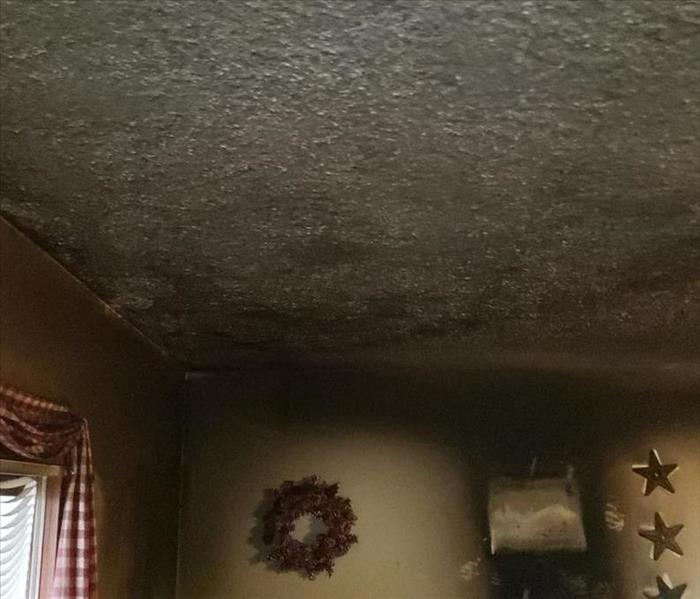 Extensive smoke and soot damage to this Ross County home.
Extensive smoke and soot damage to this Ross County home.
It finds all the cracks and crevices, and goes everywhere. Smoke and soot is extremely invasive and can penetrate various cavities within your home, causing hidden damage and odor. Our smoke damage expertise and experience allows us to inspect and accurately assess the extent of the damage to develop a comprehensive plan of action.
Did You Know? Here are some facts about smoke and soot:
- Hot smoke migrates to cooler areas and upper levels of a structure.
- Smoke flows around plumbing systems, seeping through the holes used by pipes to go from floor to floor.
- The type of smoke may greatly affect the restoration process.
Different Types of Smoke
There are two different types of smoke–wet and dry. As a result, there are different types of soot residue after a fire. Before restoration begins, SERVPRO of Jackson and Ross, Athens and Gallia Counties will test the soot to determine which type of smoke damage occurred. The cleaning procedures will then be based on the information identified during pretesting. Here is some additional information:
Wet Smoke – Plastic and Rubber
- Low heat, smoldering, pungent odor, sticky, smeary. Smoke webs are more difficult to clean.
Dry Smoke – Paper and Wood
- Fast burning, high temperatures, heat rises therefore smoke rises.
Protein Fire Residue – Produced by evaporation of material rather than from a fire
- Virtually invisible, discolors paints and varnishes, extreme pungent odor.
Our Fire Damage Restoration Services
Since each smoke and fire damage situation is a little different, each one requires a unique solution tailored for the specific conditions. We have the equipment, expertise, and experience to restore your fire and smoke damage. We will also treat your family with empathy and respect and your property with care.
Have Questions about Fire, Smoke, or Soot Damage?
Call Us Today – 740-286-2550
Puff Backs
3/15/2018 (Permalink)
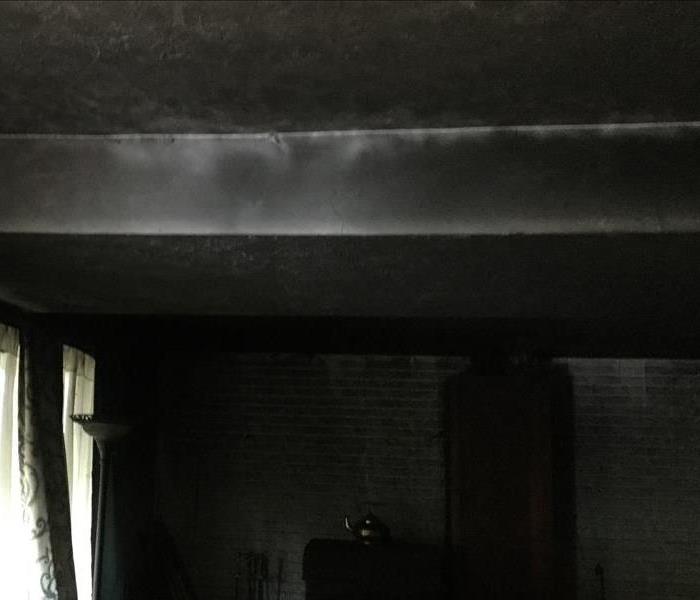 Soot can be stubborn and requires specific methods based on the source. Leave the cleanup to your local SERVPRO professionals.
Soot can be stubborn and requires specific methods based on the source. Leave the cleanup to your local SERVPRO professionals.
How Do Puff Backs Occur?
Puff backs occur due to a furnace malfunction and causes soot to spread throughout your home. This usually occurs with oil burning furnaces that have resulted in an explosion.
Removal Process:
Soot should likely be removed by a professional cleaning service in order to prevent further damage. Specific products are used during the removal process and necessary precautions taken to protect other unaffected areas of your home.
Prevention:
One simple method of preventing a puff back is by constantly making sure the oil heating system is dust free. Another way for ultimate protection is to have your heating system inspected and serviced annually.
Professional Service:
If this happens to you, call SERVPRO of Jackson & Ross Counties at 740-286-2550. Our team offers multiple cleaning services to residential and commercial structures. Serving Jackson, Ross, Vinton, and Pike Counties and neighboring areas.
Fire, Smoke and Soot Damage
12/1/2017 (Permalink)
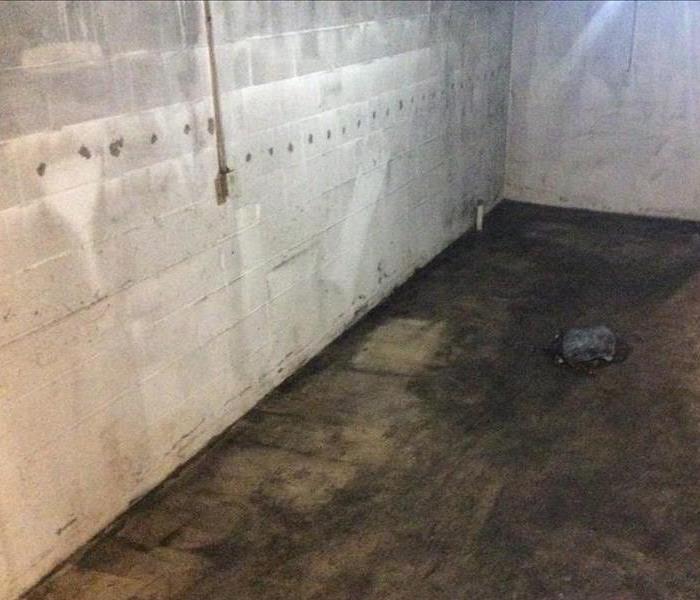 Every fire damage is unique. SERVPRO of Jackson & Ross has the equipment, expertise & experience to restore your home or business. Call 740-286-2550
Every fire damage is unique. SERVPRO of Jackson & Ross has the equipment, expertise & experience to restore your home or business. Call 740-286-2550
It goes everywhere. Smoke and soot is extremely invasive and can penetrate various cavities within your home, causing hidden damage and odor. Our smoke damage expertise and experience allows us to inspect and accurately assess the extent of the damage to develop a comprehensive plan of action.
Did You Know? Here are some facts about smoke and soot:
- Hot smoke migrates to cooler areas and upper levels of a structure.
- Smoke flows around plumbing systems, seeping through the holes used by pipes to go from floor to floor.
- The type of smoke may greatly affect the restoration process.
Different Types of Smoke
There are two different types of smoke–wet and dry. As a result, there are different types of soot residue after a fire. Before restoration begins, SERVPRO of Athens & Gallia Counties will test the soot to determine which type of smoke damage occurred. The cleaning procedures will then be based on the information identified during pretesting. Here is some additional information:
Wet Smoke – Plastic and Rubber
- Low heat, smoldering, pungent odor, sticky, smeary. Smoke webs are more difficult to clean.
Dry Smoke – Paper and Wood
- Fast burning, high temperatures, heat rises therefore smoke rises.
Protein Fire Residue – Produced by evaporation of material rather than from a fire
- Virtually invisible, discolors paints and varnishes, extreme pungent odor.
Our Fire Damage Restoration Services
Since each smoke and fire damage situation is a little different, each one requires a unique solution tailored for the specific conditions. We have the equipment, expertise, and experience to restore your fire and smoke damage. We will also treat your family with empathy and respect and your property with care.
Have Questions about Fire, Smoke, or Soot Damage?
Call Us Today – 740-286-2550
 Confined fires, those fires confined to chimneys, flues, or flue burners, accounted for 87 percent of residential building heating fires. (USFA)
Confined fires, those fires confined to chimneys, flues, or flue burners, accounted for 87 percent of residential building heating fires. (USFA)






 24/7 Emergency Service
24/7 Emergency Service






